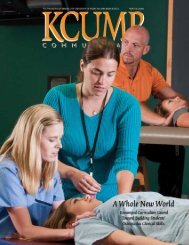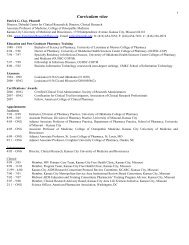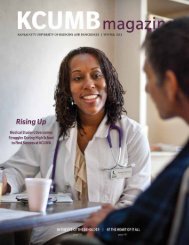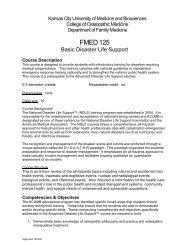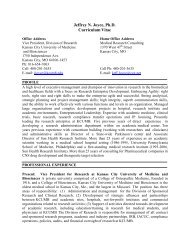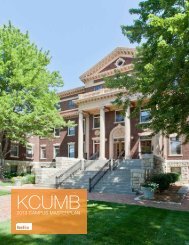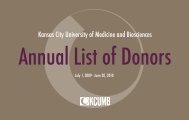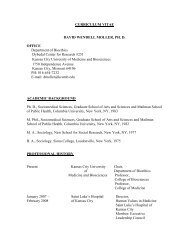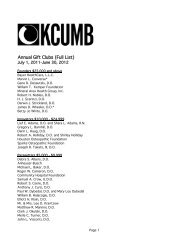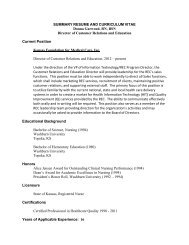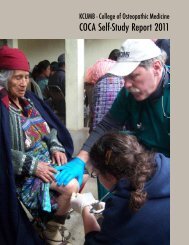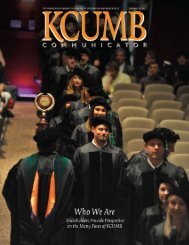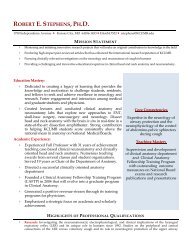2009-2010 KCUMB College Catalog - Kansas City University of ...
2009-2010 KCUMB College Catalog - Kansas City University of ...
2009-2010 KCUMB College Catalog - Kansas City University of ...
Create successful ePaper yourself
Turn your PDF publications into a flip-book with our unique Google optimized e-Paper software.
MED 202 – Endocrine (6 weeks)<br />
The Endocrinology section focuses on the synthesis, function and regulation <strong>of</strong><br />
various hormones in both normal and disease states. The structure and role <strong>of</strong> various<br />
endocrine organs is studied. Content for each presentation will include basic science<br />
material fundamental to understanding <strong>of</strong> the normal condition along with clinically<br />
relevant material such as diagnosis and treatment. Presentations such as diabetes will<br />
correlate metabolic and physiologic changes with the underlying disease process. The<br />
section will be presented using lecture, small-group discussion, computer-aided<br />
instruction and laboratory formats. Osteopathic diagnosis and treatment (ODT) <strong>of</strong><br />
disorders is integrated through the section. At the conclusion <strong>of</strong> each clinical<br />
presentation, a practicing clinician, along with basic scientists, conduct a review <strong>of</strong> the<br />
presented material for the purpose <strong>of</strong> integrating basic science and clinical information.<br />
9 semester credits<br />
MED 203 – Reproduction and Development (8 weeks)<br />
The Reproduction and Development section introduces the male and female<br />
reproductive systems. The section will begin with a discussion <strong>of</strong> the early development<br />
from fertilization through delivery with a focus on normal structure and function <strong>of</strong> the<br />
male and female systems. Abnormal development and behaviors will also be presented.<br />
12 semester credits<br />
ACLS – Advanced Cardiac Life Support<br />
Non-credit. Certification is required prior to clinical clerkship participation and for<br />
graduation. All students must pass <strong>KCUMB</strong>’s course. Graded S/U.<br />
IOCS II – Integrated Osteopathic Clinical and Communication Skills II<br />
This is the second portion <strong>of</strong> a two-year curriculum. It builds on the skills learned in<br />
IOCS I and is designed to teach students how to perform a history and physical exam,<br />
appropriately communicate with patients, and integrate the use <strong>of</strong> osteopathic principles<br />
and practices into patient care. (Scheduled for fall <strong>2010</strong> deactivation.)<br />
5 semester credits<br />
OCS 201 – Osteopathic Clinical Skills III (17 weeks)<br />
OCS 201 the third component <strong>of</strong> a two-year longitudinal course that meets formally<br />
every week throughout the semester. It is designed to teach students more <strong>of</strong> the history<br />
and physical exam as related to systems covered within the sections, continue to learn<br />
appropriate communicate with patients by beginning to integrate the physical<br />
examination skills, and integrate the use <strong>of</strong> osteopathic principles and practices into<br />
patient care. The primary areas <strong>of</strong> focus in the OCS 201 curriculum are pr<strong>of</strong>essional<br />
communication with integration <strong>of</strong> physical examination skills and documentation <strong>of</strong> the<br />
encounter; application <strong>of</strong> new osteopathic manipulative medicine skills taught in the<br />
course. (OCS 201 begins with the Class <strong>of</strong> 2013.)<br />
3 semester credits<br />
100




